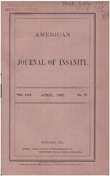High relapse rate after discontinuation of adjunctive medication for elderly patients with recurrent major depression
Abstract
OBJECTIVE: The authors documented outcomes of elderly depressed patients requiring adjunctive medication during acute-phase pharmacotherapy because of slow or partial response to nortriptyline. Twenty-eight patients (17.7%) received inpatient care at some point during acute-phase treatment. METHOD: Rates of response, relapse, and sustained remission were examined in 158 elderly patients with recurrent major depression, grouped by whether they received brief treatment with adjunctive medication (lithium, perphenazine, or paroxetine) (N = 39) or did not (N = 119). RESULTS: The group receiving adjunctive medication had a lower rate of response to acute therapy (64.1% versus 83.2%), a higher relapse rate during continuation therapy (52.0% versus 6.1%), and a lower rate of sustained remission (recovery) (48.7% versus 76.5%) than did the group without augmentation. CONCLUSIONS: Elderly depressed patients requiring augmented pharmacotherapy to achieve remission may need continuation of adjunctive medication to remain well and to avoid early relapse. Alternatively, factors that lead to augmentation in the first place (e.g., heightened anxiety) may also increase the risk of relapse.
Access content
To read the fulltext, please use one of the options below to sign in or purchase access.- Personal login
- Institutional Login
- Sign in via OpenAthens
- Register for access
-
Please login/register if you wish to pair your device and check access availability.
Not a subscriber?
PsychiatryOnline subscription options offer access to the DSM-5 library, books, journals, CME, and patient resources. This all-in-one virtual library provides psychiatrists and mental health professionals with key resources for diagnosis, treatment, research, and professional development.
Need more help? PsychiatryOnline Customer Service may be reached by emailing [email protected] or by calling 800-368-5777 (in the U.S.) or 703-907-7322 (outside the U.S.).



